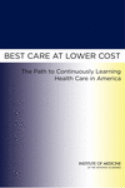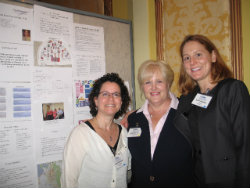 Medicare has become a central issue during this heated election season, but the debates are loud, confusing, and often play off fear, intergenerational conflict, and ideological differences about the role of government. Unfortunately, what gets lost in the raucous debate is the opportunity we all have at this particular moment to preserve Medicare, lower its costs, and at the same time improve people’s health.
Medicare has become a central issue during this heated election season, but the debates are loud, confusing, and often play off fear, intergenerational conflict, and ideological differences about the role of government. Unfortunately, what gets lost in the raucous debate is the opportunity we all have at this particular moment to preserve Medicare, lower its costs, and at the same time improve people’s health.
How can we do this? By working together—no matter our political persuasion—to transform the way care is delivered in Medicare and throughout the U.S. health care system.
I had the opportunity last week to see a federal program that is doing just that. It was the last meeting of this year’s Innovation Advisors, participants in an initiative sponsored by the Center for Medicare and Medicaid Innovation, created under the Affordable Care Act. My colleague, Amy Berman, introduced readers to the Innovation Advisors back in February, and has been involved in their training and development since. The goal of the program is to support individuals who can test and refine new models to drive delivery system reform—models that result in better care, better health, and lower costs.
Seventy-two health care Innovation Advisors were selected from 920 applicants for six months of intensive training and support in the development of innovative projects. This interdisciplinary group of doctors, nurses, and other health professionals focus on a range of care settings and problems, from reducing avoidable hospital readmissions to better managing chronic conditions among their patients. The people they serve include children and the poor under Medicaid coverage, as well as the Hartford Foundation’s population of interest—older adult Medicare beneficiaries.
At their September meeting, Advisors reported improvements in their organizations from increased hospital post-discharge clinic appointments to reduced geriatric patient falls in the emergency department. Some were already starting to see cost savings because of their interventions. All demonstrated a passion and commitment for involving people in their own health care and in the systems redesign process they are undertaking.
 The work of these individual leaders embodies what the non-partisan Institute of Medicine recently called for in Best Care at Lower Cost: The Path to Continuously Learning Health Care in America. The report charges us with developing a more adaptive, continuously learning health care system to overcome the staggering amounts of waste and inefficiency we currently tolerate; almost a third of U.S. health care spending in 2009—roughly $750 billion!—was wasted in unnecessary health spending and poor quality care. Innovation Advisors and many of our grantees are helping to build this more efficient, adaptive learning system, using health IT and data, implementing quality improvement programs, and promoting patient engagement in health care decisions.
The work of these individual leaders embodies what the non-partisan Institute of Medicine recently called for in Best Care at Lower Cost: The Path to Continuously Learning Health Care in America. The report charges us with developing a more adaptive, continuously learning health care system to overcome the staggering amounts of waste and inefficiency we currently tolerate; almost a third of U.S. health care spending in 2009—roughly $750 billion!—was wasted in unnecessary health spending and poor quality care. Innovation Advisors and many of our grantees are helping to build this more efficient, adaptive learning system, using health IT and data, implementing quality improvement programs, and promoting patient engagement in health care decisions.
The approach to support individuals as leaders of transformational change is something we believe in strongly at the Hartford Foundation. We know that while the essential elements to changing our health care delivery system include having the right policies and incentives, an infrastructure for sharing information and measuring quality, evidence-based models of care, and a well-trained workforce, we must also have strong individual leaders who can test, refine, and implement all of these elements on the ground, in the real world. We need these champions who can bring others along with them in the change process, which can be so daunting, particularly in the complex, high-dollar, life-and-death world of health care.
At their meeting, Innovation Advisors brought with them 38 senior leaders of their health care organizations—hospital CEOs and board members, directors of nursing, and others—demonstrating their organizational commitment to not only changing processes and systems, but to changing culture.
 From left, Laura K. Botwinick, Director of the Graduate Program in Health Administration and Policy at the University of Chicago and CMMI Innovation Advisors Program Mentor; Amy Berman, Senior Program Officer, John A. Hartford Foundation; and Sarah Woolsey, M.D., FAAFP Innovation Advisor, HealthInsight, Salt Lake City, Utah, at the Innovation Advisors meeting.
From left, Laura K. Botwinick, Director of the Graduate Program in Health Administration and Policy at the University of Chicago and CMMI Innovation Advisors Program Mentor; Amy Berman, Senior Program Officer, John A. Hartford Foundation; and Sarah Woolsey, M.D., FAAFP Innovation Advisor, HealthInsight, Salt Lake City, Utah, at the Innovation Advisors meeting.We at the Hartford Foundation are looking forward to further helping the Innovation Advisors and others in working to change health care culture and systems. We will be funding a companion and expansion of the Innovation Advisors Program through a new grant called the Practice Change Leaders for Aging and Health. We will share more with you about this program in the coming weeks.
One important job for the Innovation Advisors, Practice Change Leaders and others like them will be to help us all focus and prioritize. As one speaker at the Advisors meeting put it, health care workers are drowning under a waterfall of initiatives right now. In my opinion, the waterfall is good. In fact, that’s what we should be talking more about in our political debates. We don’t know enough about what will truly solve our problems and sustain Medicare and the U.S. health care system, and we need everyone to be involved in developing and sorting through the best solutions.
As the political season and emotionally charged debates about Medicare continue to heat up, we hope you will think more broadly about the issue. We hope you will ask your policy makers and electoral candidates about their positions, not just about Medicare benefits and financing, but about how they think we should be working together to redesign health care delivery to keep people safe and healthy, and do so in a financially sustainable way.
